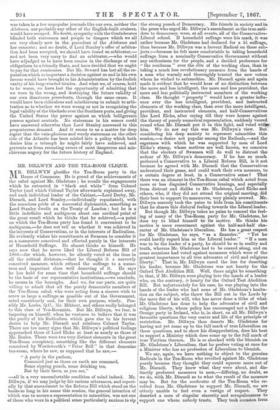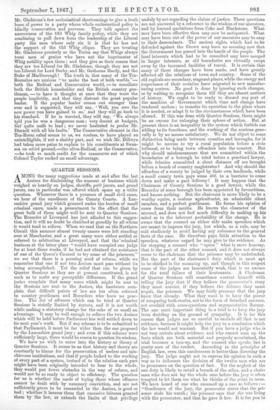MR. DILLWYN AND THE TEA-ROOM CLIQUE.
M R. DILLWYN glorifies the Tea-Room party in the .111. House of Commons. He is proud of the achievements of the cabal against Mr. Gladstone ; he recalls the engagements which he extracted in " black and white " from Colonel Taylor (and which Colonel Taylor afterwards explained away, and each individual leader of the Cabinet,—Lord Derby, Mr. Disraeli, and Lord Stanley,—individually repudiated), with the conscious pride of a successful diplomatist, something as Lord Stanley dwells on the Treaty of London • but he is a little indefinite and ambiguous about one cardinal point of the great result which he thinks that he achieved,—a point on which the Tea-Room party has found it convenient to be ambiguous,—he does not tell us whether it was achieved in the interests of Conservatism, or in the interests of Radicalism. He evidently wishes his constituents at Swansea to consider it as a manoeuvre conceived and effected purely in the interests of Household Suffrage. He almost thinks so himself. He says now that he never liked the Liberal Reform Bill of 1866—for which, however, he silently voted at the time in all the critical divisions,—that he thought it a narrowly conceived measure, which refused the suffrage to a nume- rous and important class well deserving of it. He says he has held for some time that household suffrage should be the basis of our representative institutions,—we conclude, he means in the boroughs. And we, for our parts, are quite willing to admit that all the purely democratic members of the Tea-Room cabal, who were acting from a sincere wish to screw as large a suffrage as possible out of the Government, acted consistently and, for their own purpose, wisely. Pos- sibly Mr. Locke, Q.C., Mr. Hibbert, and others really belonged to this class of Tea-Roomists. But Mr. Dillwyn, we fear, is imposing on himself, when he ventures to believe that it was the purity of his Radicalism which gave rise to his fervent desire to help Mr. Disraeli and reinforce Colonel Taylor. There are too many signs that Mr. Dillwyn's political feelings approached those of Lord Elcho at least as nearly as those of Mr. Beales. There were two very distinct elements in the great Tea-Room conspiracy, something like the different elements conceived by Wordsworth's " Peter Bell " in that demoniac tea-room, where he saw, or supposed that he saw,— " A party in the parlour, Crammed just as those on earth are crammed, Some sipping punch, some drinking tea, But by their faces, as you see," —all in a very uncomfortable condition of mind indeed. Mr. Dillwyn, if we may judge by his various utterances, and especi- ally by that amendment to the Reform Bill which stood on the books so long in his name this session, the general intention of which was to secure a representation to minorities, was not one of those who were in a political sense particularly anxious to sip the strong punch of Democracy. His friends in society and in the press who urged Mr. Dillwyn's amendment as the true anti- dote to democracy, were, at all events, all of the Conservative- Liberal school. If household suffrage were his mark, it was rather because Mr. Gladstone had declared for a 5/. suffrage, than because Mr. Dillwyn was a fervent Radical on these sub- jects ;—because he felt more comfortable in taking household suffrage. from a nominally Conservative Government without any enthusiasm for the people, and a decided preference for " the residuum " over the Rite of the working class, than in taking a much less revolutionary measure from the hands of a man who warmly and thoroughly trusted the new voters whom he wished to enfranchise. Mr. Disraeli again and again made it evident that he would hear of no distinction between the more and less intelligent, the more and less provident, the- more and less politically instructed members of the working class. He thought "property " would have a greater influ- ence over the less intelligent, provident, and instructed_ elements of the working class, than over the more intelligent, provident, and instructed elements, and half-Conservatives like Lord Elcho, after crying till they were hoarse against the theory of purely numerical representation, suddenly veered round when Mr. Disraeli put it in this light, and voted with him. We do not say this was Mr. Dillwyn's view. But considering his deep anxiety to represent mincnities this session,—a desire not popular among the Radicals,—and the- eagerness with which he was supported by men of Lord Elcho's stamp, whose motives are well known, we conceive- that the electors of Swansea will do well to distrust the- ardour of Mr. Dillwyn's democracy. If he has so much preferred a Conservative to a Liberal Reform Bill, is it not because he agreed with Mr. Disraeli that the Conservatives. understood their game, and could work their own measure, to. a certain degree at least, in a Conservative sense I That there was an element in the Tea-Room cabal which acted from more or less disguised Conservative leanings, and especially from distrust and dislike to Mr. Gladstone, Lord Elcho and others, who, if they did not attend the original meeting, did their best to support its manoeuvre, very plainly avowed. Mr.. Dillwyn scarcely took-the pains to hide from his constituents. that he shares this disloyal feeling towards the Liberal leader.
But though Mr. Dillwyn takes no pains to conceal the feel- ing of many of the Tea-Room party for Mr. Gladstone, he try to blind himself to its motive. He thinks his- motive is mere resentment against the half-and-half cha- racter of Mr. Gladstone's liberalism. He has a great respect for Mr. Gladstone, he says, " as a financier." " Yet he, could hardly regard him as the Liberal leader." "If a man- was to be the leader of a party, he should be so in reality and truth, whereas Mr. Gladstone had to be coaxed along, and on some occasions had voted against measures which were of the- greatest importance to all true advocates of civil and religious. liberty." That is, Mr. Dillwyn cared the less for deserting- his leader, because Mr. Gladstone was not hearty for the- Oxford Test Abolition Bill. Well, there might be something in that, if Mr. Dillwyn were playing into the hands of a leader- who, on the contrary, is hearty for the Oxford Test Abolition. Bill. But unfortunately for his case, he was playing into the- hands of the leader who had none of Mr. Gladstone's hesita- tion on the subject, who threw the Bill out in the Lords by- the mere fiat of his will, who has never done a tithe of what. Mr. Gladstone has done to help the advocates of civil and religious liberty, whose policy has encouraged not a little the- Orange party in Ireland, who is, in short, on all Mr. Dillwyn's favourite questions the very centre and life of the principle of restriction. Mr. Dillwyn thus deserts Mr. Gladstone for having not yet come up to the full mark of true Liberalism on these questions, and to show his disapprobation, does his best to support a Ministry which does come up to the full mark of Toryism thereon. He is so shocked with the blemish on Mr. Gladstone's Liberalism, that he prefers voting at once for' a Minister who has no profession of Liberalism to blemish.
We say, again, we have nothing to object to the genuine' Radicals in the Tea-Room who revolted against Mr. Gladstone purely because they thought they could squeeze more out of Mr. Disraeli. They knew what they were about, and dis- tinctly preferred measures to men,—differing, no doubt, as we do, with Mr. Disraeli as to what the result of the measure may be. But for the moderates of the Tea-Room who re- volted from Mr. Gladstone to support Mr. Disraeli, we are utterly unable to feel even a vestige of respect. They deserted a man of singular sincerity and scrupulousness to support one whom nobody trusts. They took occasion from Mr. Gladstone's few ecclesiastical shortcomings to give a fresh lease of power to a party whose whole ecclesiastical policy is blindly conservative and perverse. They talk against the narrowness of the Old Whig family policy, while they are combining to pull down from the leadership of the Liberal party the man whose only sin it is that he has not the support of the Old Whig clique. They are treating Mr. Gladstone precisely as the Tories say that Whigs always treat men of genius who have not the imprimatur of Whig nobility upon them ; and they give as their reason that they are too Liberal for Mr. Gladstone, though they are not too Liberal for Lord Derby, and Mr. Gathorne Hardy, and the Duke of Marlborough! The truth is, that many of the Tea- Roomites are anxious " to make the best of both worlds,"— both the Radical and Conservative world, — to conciliate both the British householder and the British country gen- tleman, — to have it thought at once that they trust the people implicitly, and that they distrust the great popular leader. If the popular leader comes out stronger than ever and is supported, they will say, Well, you owe the new power you have gained to us,' and they will go back to his standard. If he is worsted, they will say, We always told you he was a dangerous man ; very decent at budgets, bitt• quite unfit to lead ; we never hesitated to prefer Mr. Disraeli with all his faults.' The Conservative element in the Tea-Room cabal seems to us, we confess, to have played an unintelligible, if not a shabby part, and we wish Mr.. Dillwyn had taken more pains to explain to his constituents at Swan- sea on which ground,—the ultra-Radical, or the Conservative, —he took so much credit for the manoeuvre out of which Colonel Taylor sucked no small advantage.































 Previous page
Previous page